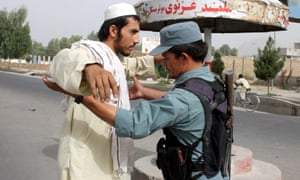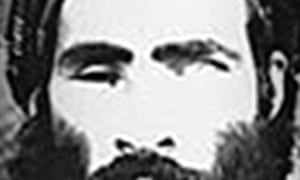Senior source in militant group tells Reuters that deputy Mullah Akhtar Mansoor has been elected as successor Afghan official frisks a man by the roadside in Kandahar, Mullah Omar’s home town, after security was intensified following reports of his death. Photograph: Muhammad Sadiq/EPA
Afghan official frisks a man by the roadside in Kandahar, Mullah Omar’s home town, after security was intensified following reports of his death. Photograph: Muhammad Sadiq/EPA
The Taliban has officially announced the death of its founder and spiritual leader Mullah Omar.
The confirmation of Omar’s death comes after months of increased speculation about his whereabouts. The Afghan government on Wednesday claimed it had credible intelligence that Omar died over two years ago. After a day of silence, the Taliban confirmed his death, quoting family members.
Reuters reported that a leadership council in Pakistan has appointed Omar’s deputy, Mullah Akhtar Mansoor, to head the movement. An undated image believed to show Mullah Omar. Photograph: National Counter Terrorism Center/Reuters
An undated image believed to show Mullah Omar. Photograph: National Counter Terrorism Center/Reuters
“The shura held outside Quetta unanimously elected Mullah Mansoor as the new emir of the Taliban,” a senior, anonymous Afghan Taliban commander told Reuters. The Taliban statement did not mention a successor.
Omar’s death could throw the movement into upheaval. Already a splintered organisation, most Taliban collectively looked to Omar as a unifying figure.
Mansoor has led the insurgency in day-to-day operations for years, but lacks Omar’s legitimacy as a spiritual leader.
It is thought that some factions of the Taliban have pushed for Omar’s son to succeed him, and they might see Mansoor as a choice of certain wings of the movement close to Pakistan.
The ghost-like Omar, who led the movement since its inception in 1994, shunned publicity and disappeared completely from public view after his government was toppled in 2001. Rumours of his death have circulated for more than a decade, causing the movement to fracture.
Rumours of his death have circulated for more than a decade, causing the movement to fracture.
Disgruntled ground commanders have pressed the leadership for proof of Omar’s life. Some have formed their own splinter groups, a few of whom have pledged allegiance to Islamic State.
The turmoil in the Taliban comes at a time when the Afghan government and representatives of the insurgency are exploring ways to restart peace talks.
Two weeks ago, a statement purportedly from Omar endorsed the talks, in an attempt to unify the movement behind reconciliation efforts. The announcement of his death could pit hardliners against those who favour a negotiated solution to the conflict.
On Thursday, at the request of the Taliban leadership, the Pakistani government issued a statement postponing the second round of peace talks, which had been slated for Friday.































